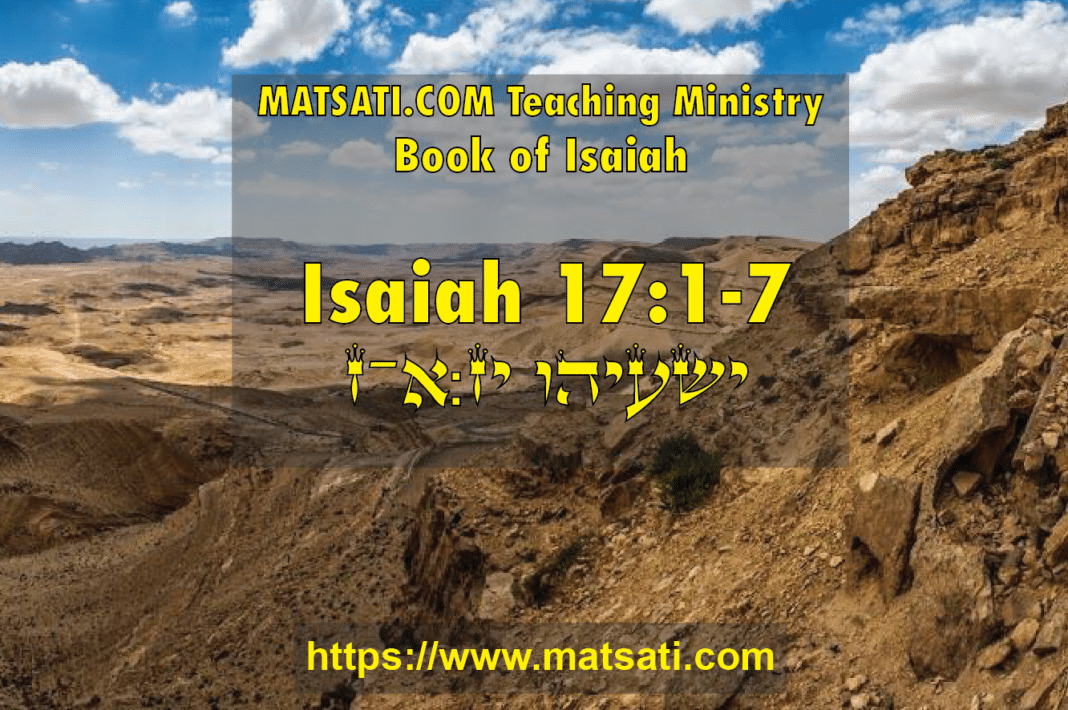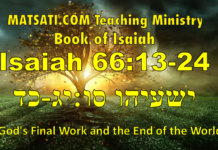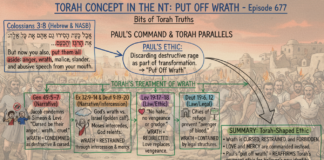Isaiah 17:1-7
In chapter 17, Isaiah speaks about Damascus and northern Israel. Commentators suggest that this was an earlier prophecy and question why this was placed here in chapter 17. They place this during the alliance that the king of Israel made with Syria in 735-732 BC. Isaiah 17:1-14 however continues the theme of trusting in God as opposed to the nations. This reminds us of what Isaiah says according to Isaiah 7-12. The primary point is that we are to trust in God because he ultimately will be the one who wins, but not just this, also that He loved us and seeks for His people to return to Him. Trusting in self, wealth, man, or the flesh (Jeremiah 17:5-10) is foolish and leads to one’s destruction. These are the things Damascus and Northern Israel did which ultimately led to their destruction, indicated by Isaiah’s opening words that the city is about to be taken away. Remember, later in history Jeremiah writes that the country towns depend upon Damascus (Jeremiah 34:1, 49:13, 51:43). The idea may be that Damascus functioned as a barrier to the northern kingdom due to its geographical location. Maybe Ephraim hoped that Damascus would defeat the invading armies and so they trusted in them as opposed to God. Nevertheless, it is the Lord God of Israel who protects and controls nations. Isaiah opens chapter 17 saying the following.

ספר ישעיה פרק יז
א מַשָּׂא דַּמָּשֶֹק הִנֵּה דַמֶּשֶֹק מוּסָר מֵעִיר וְהָיְתָה מְעִי מַפָּלָה: ב עֲזֻבוֹת עָרֵי עֲרֹעֵר לַעֲדָרִים תִּהְיֶינָה וְרָבְצוּ וְאֵין מַחֲרִיד:
Isaiah 17:1 states, “The burden of Damascus. Behold, Damascus is taken away from being a city, and it shall be a ruinous heap. (מַשָּׂא דַּמָּשֶֹק הִנֵּה דַמֶּשֶֹק מוּסָר מֵעִיר וְהָיְתָה מְעִי מַפָּלָה)” Isaiah 17:2 “The cities of Aroer are forsaken: they shall be for flocks, which shall lie down, and none shall make them afraid. (עֲזֻבוֹת עָרֵי עֲרֹעֵר לַעֲדָרִים תִּהְיֶינָה וְרָבְצוּ וְאֵין מַחֲרִיד)” Damascus was a wealthy city because it was located at a geographical location that was a major highway between Mesopotamia and Egypt.
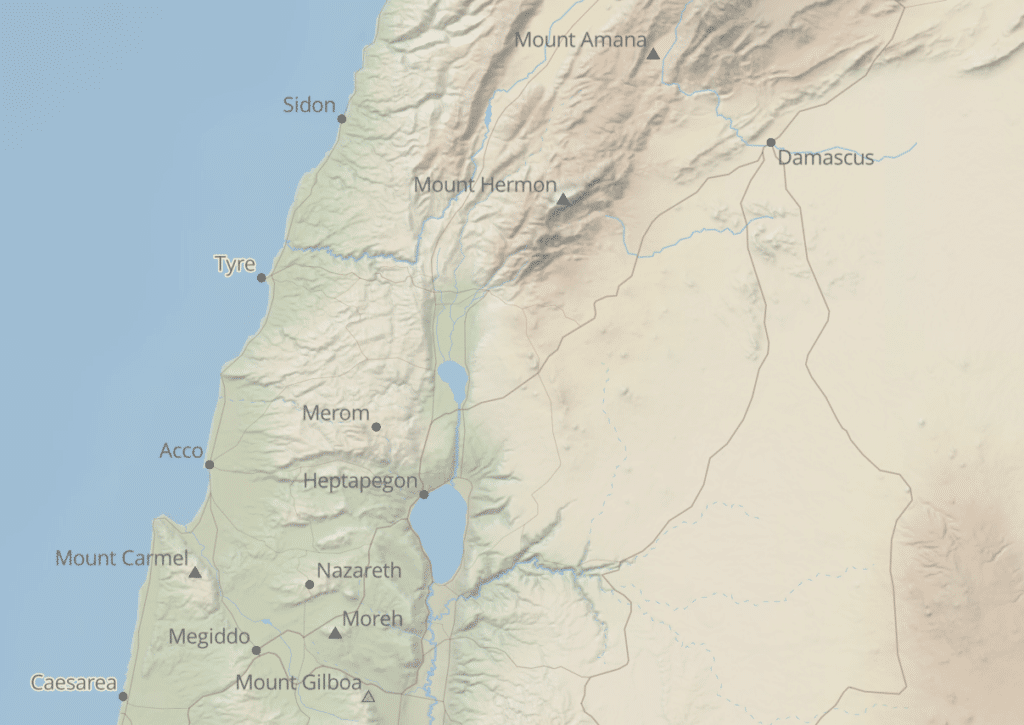
As we can see, Damascus stood as a barrier between the northern region and the southern regions. Damascus likely held a more neutral position, as being a city of wealth and for travelers to buy and sell. Isaiah however states that Damascus will be a ruin because of her sins. Isaiah 17:1 states מַשָּׂא דַּמָּשֶֹק הִנֵּה דַמֶּשֶֹק מוּסָר מֵעִיר וְהָיְתָה מְעִי מַפָּלָה “The burden of Damascus. Behold, Damascus is taken away from being a city, and it shall be a ruinous heap.” We note that the word מוּסָר is not the same Hebrew term Musar (מוּסַר). Here it means to change direction taken from the root סור meaning to turn direction, and so is interpreted as being taken from being a city (מוּסָר מֵעִיר). Isaiah 17:2 speaks of the desolation of the place, עֲזֻבוֹת עָרֵי עֲרֹעֵר לַעֲדָרִים תִּהְיֶינָה וְרָבְצוּ וְאֵין מַחֲרִיד “The cities of Aroer are forsaken: they shall be for flocks, which shall lie down, and none shall make them afraid.” We note how the Targum translates when compared to the Hebrew bible:
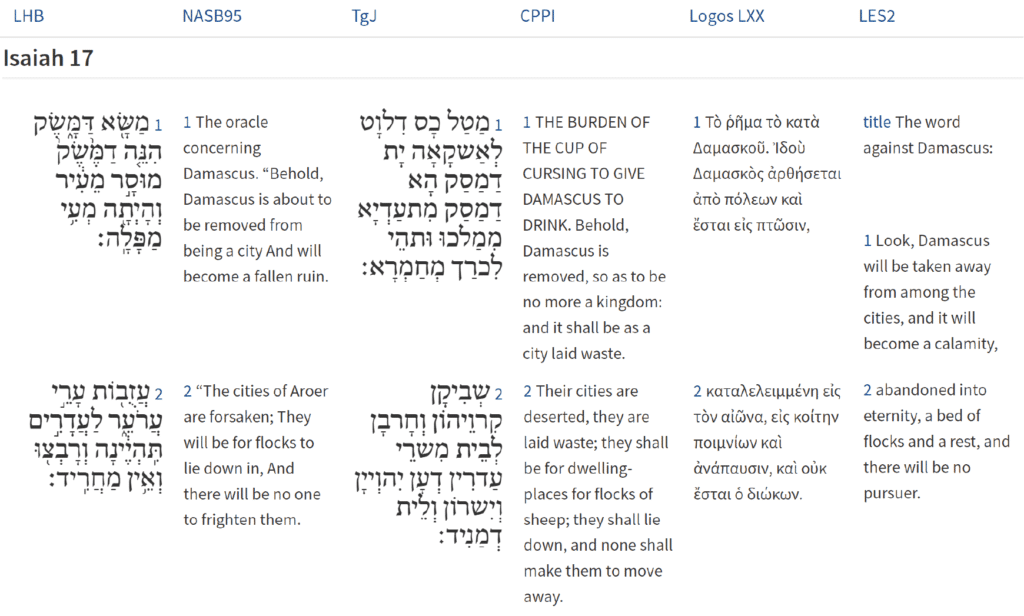
TgJ translates and describes this place as the flocks will lay down and not be disturbed because this place will no longer be a dwelling place for men.
ספר ישעיה פרק יז
ג וְנִשְׁבַּת מִבְצָר מֵאֶפְרַיִם וּמַמְלָכָה מִדַּמֶּשֶֹק וּשְׁאָר אֲרָם כִּכְבוֹד בְּנֵי-יִשְֹרָאֵל יִהְיוּ נְאֻם יְהֹוָה צְבָאוֹת:
Isaiah 17:3 states, “The fortress also shall cease from Ephraim, and the kingdom from Damascus, (וְנִשְׁבַּת מִבְצָר מֵאֶפְרַיִם וּמַמְלָכָה מִדַּמֶּשֶֹק) and the remnant of Syria: they shall be as the glory of the children of Israel, saith the LORD of hosts. (וּשְׁאָר אֲרָם כִּכְבוֹד בְּנֵי-יִשְֹרָאֵל יִהְיוּ נְאֻם יְהֹוָה צְבָאוֹת)” Here Isaiah speaks of the fortifications will also not be sufficient against the invading army in which God brings upon this place. The idea here is that just as the children of Israel fell in their sin, so too Damascus will, which may be why Isaiah wrote, וּשְׁאָר אֲרָם כִּכְבוֹד בְּנֵי-יִשְֹרָאֵל יִהְיוּ נְאֻם יְהֹוָה. Syria will be like Israel, only a remnant will remain and so the Lord will not totally destroy all of the peoples. This may be indicated by the idea of flocks remaining (Isaiah 17:1-2) as there are those who remain to tend those flocks. If this was not true; Isaiah would have described the place as being a place for jackals and wild beasts of the field.
ספר ישעיה פרק יז
ד וְהָיָה בַּיּוֹם הַהוּא יִדַּל כְּבוֹד יַעֲקֹב וּמִשְׁמַן בְּשָֹרוֹ יֵרָזֶה: ה וְהָיָה כֶּאֱסֹף קָצִיר קָמָה וּזְרֹעוֹ שִׁבֳּלִים יִקְצוֹר וְהָיָה כִּמְלַקֵּט שִׁבֳּלִים בְּעֵמֶק רְפָאִים: ו וְנִשְׁאַר-בּוֹ עוֹלֵלֹת כְּנֹקֶף זַיִת שְׁנַיִם שְׁלשָׁה גַּרְגְּרִים בְּרֹאשׁ אָמִיר אַרְבָּעָה חֲמִשָּׁה בִּסְעִפֶיהָ פֹּרִיָּה נְאֻם-יְהֹוָה אֱלֹהֵי יִשְֹרָאֵל:
Isaiah 17:4 states, “And in that day it shall come to pass, that the glory of Jacob shall be made thin, and the fatness of his flesh shall wax lean. (וְהָיָה בַּיּוֹם הַהוּא יִדַּל כְּבוֹד יַעֲקֹב וּמִשְׁמַן בְּשָֹרוֹ יֵרָזֶה)” Isaiah 17:5 “And it shall be as when the harvestman gathereth the corn, and reapeth the ears with his arm; (וְהָיָה כֶּאֱסֹף קָצִיר קָמָה וּזְרֹעוֹ שִׁבֳּלִים יִקְצוֹר) and it shall be as he that gathereth ears in the valley of Rephaim. (וְהָיָה כִּמְלַקֵּט שִׁבֳּלִים בְּעֵמֶק רְפָאִים)” Isaiah 17:6 “Yet gleaning grapes shall be left in it, as the shaking of an olive tree, two or three berries in the top of the uppermost bough, (וְנִשְׁאַר-בּוֹ עוֹלֵלֹת כְּנֹקֶף זַיִת שְׁנַיִם שְׁלשָׁה גַּרְגְּרִים בְּרֹאשׁ אָמִיר) four or five in the outmost fruitful branches thereof, saith the LORD God of Israel. (אַרְבָּעָה חֲמִשָּׁה בִּסְעִפֶיהָ פֹּרִיָּה נְאֻם-יְהֹוָה אֱלֹהֵי יִשְֹרָאֵל)” Isaiah states יִדַּל כְּבוֹד יַעֲקֹב “the glory of Jacob will be little/small” where כְּבוֹד (glory) carries with it the idea of grandeur, majesty, and significance. But because Israel trusted in men, the reality of the situation is that their glory should be given from God and not from men. Because their glory is taken from an earthly perspective, the glory of Jacob will end. This is the end result of a person, a people, or a nation obtaining glory through their own strength as opposed to receiving from God. And this is literally the meaning of וּמִשְׁמַן בְּשָֹרוֹ יֵרָזֶה “and the fatness of the flesh will dwindle.” The nation whose glory is in the reputation among the nation is weak and will dwindle. Note this is how Isaiah described the glory of dignitaries or nobles in Isaiah 5:13. In this case the people will exchange royal clothing for that of a poor person. The prophecy suggests that Ephraim will have a remnant like that which remains following reaping in the fields or harvesting grapes off the vine as there are a few that remain. Isaiah says the gathering will be like the gathering בְּעֵמֶק רְפָאִים “in the valley of Rephaim.” The valley of Rephaim begins at Jerusalem and extends southwest for several miles. The north part of the valley formed part of the boundary between Benjamin and Judah (Joshua 15:8, 18:16). It is also the scene of one of the famous exploits performed by the mighty three among the Champions of David (2 Samuel 23:13, 1 Chronicles 11:15). This event happened during a campaign led by the Philistines against David at Jerusalem (2 Samuel 5:18, 1 Chronicles 14:9). We are told that the Philistines gathered in the Valley of the Rephaim in preparation for attacking Jerusalem. In the LXX, the valley is called the “Valley of the Rephaim (Gk Raphaim)” (2 Samuel 23:13); the “Valley of the Titans (Gk Titanōn)” (2 Samuel 5:18); the “Valley of the Giants (Gk gigantōn)” (1 Chronicles 11:15; 14:9).
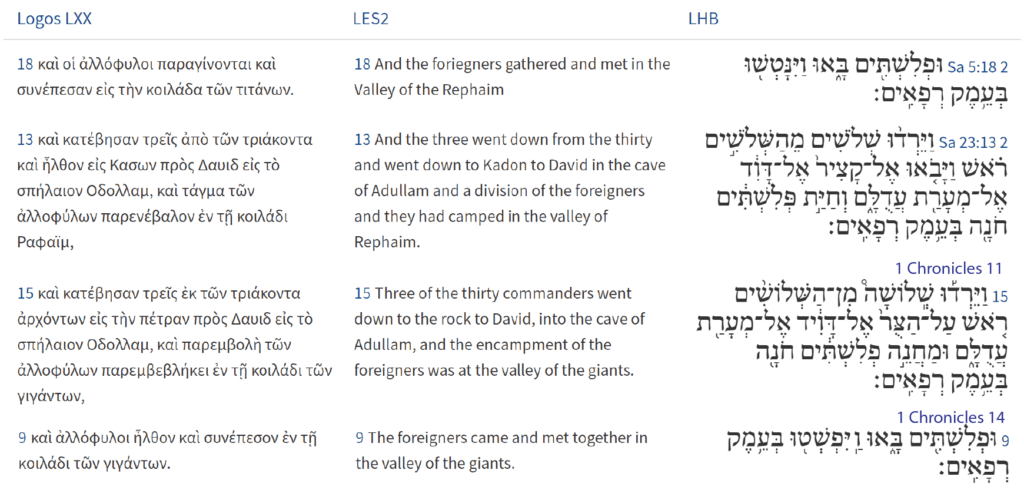
Notice how these things reveal to us how there is a tradition that the Rephaim are equivalent to Giants. So Isaiah could be using this text as part of the prophecy to emphasize the strength of the army coming to do the shaming of the nation with very few remaining. This reminds us of the Torah according to Bamidbar / Numbers 13. When the Israelites had first tried to enter the Promised Land, the spies reported the land was populated by giants, whom they called “Nephilim” and “sons of Anak” (Bamidbar / Numbers 13:32–33).
ספר במדבר יג
לא וַיּוֹצִ֜יאוּ דִּבַּ֤ת הָאָ֙רֶץ֙ אֲשֶׁ֣ר תָּר֣וּ אֹתָ֔הּ אֶל־בְּנֵ֥י יִשְׂרָאֵ֖ל לֵאמֹ֑ר הָאָ֡רֶץ אֲשֶׁר֩ עָבַ֨רְנוּ בָ֜הּ לָת֣וּר אֹתָ֗הּ אֶ֣רֶץ אֹכֶ֤לֶת יוֹשְׁבֶ֙יהָ֙ הִ֔וא וְכָל־הָעָ֛ם אֲשֶׁר־רָאִ֥ינוּ בְתוֹכָ֖הּ אַנְשֵׁ֥י מִדּֽוֹת׃ לג וְשָׁ֣ם רָאִ֗ינוּ אֶת־הַנְּפִילִ֛ים בְּנֵ֥י עֲנָ֖ק מִן־הַנְּפִלִ֑ים וַנְּהִ֤י בְעֵינֵ֙ינוּ֙ כַּֽחֲגָבִ֔ים וְכֵ֥ן הָיִ֖ינוּ בְּעֵינֵיהֶֽם׃
Bamidbar / Numbers 13:32-33
13:32 And they brought up an evil report of the land which they had searched unto the children of Israel, saying, The land, through which we have gone to search it, is a land that eateth up the inhabitants thereof; and all the people that we saw in it are men of a great stature. 13:33 And there we saw the giants, the sons of Anak, which come of the giants: and we were in our own sight as grasshoppers, and so we were in their sight. (KJV)
The tradition that the Rephaim are equivalent to Giants, mighty, and powerful warriors, plays a large part in the description of Isaiah to Damascus concerning the armies that are coming. This kind of delivers the point that the army whom God brings is very formidable, this again emphasizes why it is so important to trust in the Lord as opposed to trusting in man.
Isaiah, using the imagery of the harvest time, the corn harvest, and the olive crop (עללות) , makes the army analogous to the harvest time for the wicked. The land is ripe with unrighteousness and so it is time to harvest those who practice unrighteousness for the purpose of removing them from the Land. Yeshua also makes the analogy concerning the righteous according to Luke 10:1-3.
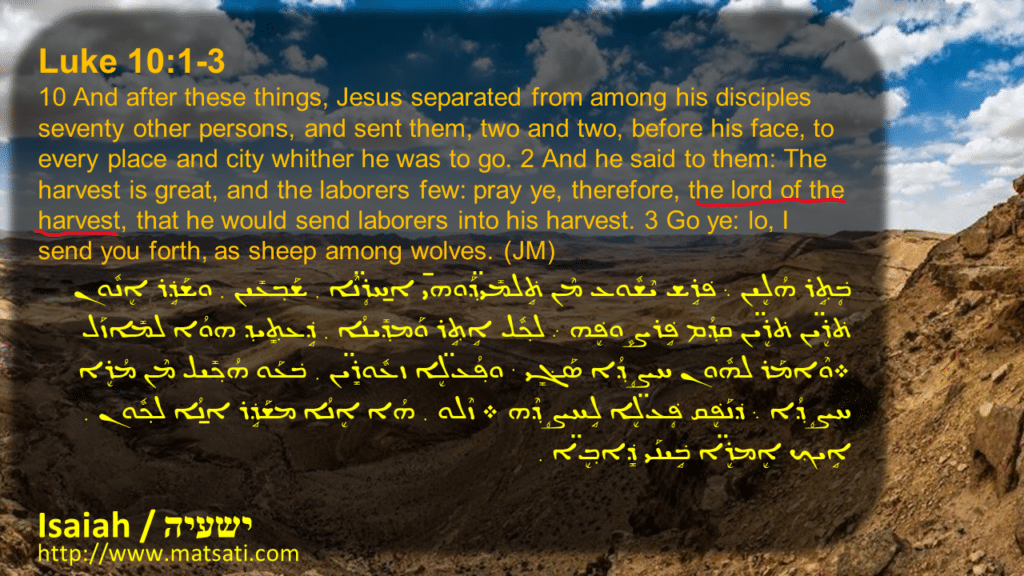
Luke 10:1-3
10:1 After these things the Lord appointed other seventy also, and sent them two and two before his face into every city and place, whither he himself would come. 10:2 Therefore said he unto them, The harvest truly is great, but the laborers are few: pray ye therefore the Lord of the harvest, that he would send forth laborers into his harvest. 10:3 Go your ways: behold, I send you forth as lambs among wolves. (KJV, ܒܴ݁ܬ݂ܱܪ ܗܳܠܷܝܢ ܆ ܦ݁ܪܱܫ ܝܶܫܽܘܥ ܡܶܢ ܬܱ݁ܠܡܺܝ̈ܕ݂ܰܘܗ̄ܝ ܐ̱ܚܪܴ̈ܢܶܐ ܂ ܫܰܒ݂ܥܺܝܢ ܂ ܘܫܰܕܱ݁ܪ ܐܷܢܽܘܢ ܬ݁ܪܷ̈ܝܢ ܬ݁ܪܷ̈ܝܢ ܩܕ݂ܳܡ ܦܱ݁ܪܨܾܘܦܷ݁ܗ ܇ ܠܟ݂ܽܠ ܐܱܬ݂ܱܪ ܘܰܡܕ݂ܺܝܢܳܐ ܂ ܕܱ݁ܥܬ݂ܻܝܕ݂ ܗܘܳܐ ܠܡܺܐܙܰܠ ܀ܘܶܐܡܰܪ ܠܗܽܘܢ ܚܨܴܕ݂ܳܐ ܣܰܓܻ݁ܝ ܁ ܘܦ݂ܳܥ̈ܠܷܐ ܙܥܽܘܪܻ̈ܝܢ ܂ ܒ݁ܥܰܘ ܗܳܟ݂ܺܝܠ ܡܶܢ ܡܳܪܷܐ ܚܨܴܕ݂ܳܐ ܆ ܕ݁ܢܰܦܷ݁ܩ ܦܴ݁ܥ̈ܠܷܐ ܠܱܚܨܴܕ݂ܶܗ ܀ ܙܶܠܘ ܂ ܗܳܐ ܐܷܢܳܐ ܡܫܰܕܱ݁ܪ ܐ̱ܢܳܐ ܠܟ݂ܽܘܢ ܂ ܐܱܝܟ݂ ܐܷܡܪܷ̈ܐ ܒܱ݁ܝܢܰܝ ܕܻ݁ܐܒ݂ܷ̈ܐ ܂)
Here God our Father in heaven is the Lord of the harvest. Remember also in Matthew 13:24-30 on the Parable of the Wheat and the Tares. The Lord God instructs the angels to separate the wheat from the tares which is an analogy of the righteous and the unrighteous, respectively. The point being ultimately it is the Lord who is in control, and we are to choose which side we will be on, whether to choose to walk in God’s ways, to believe in the Messiah of God and live our lives for him, or choose to live for ourselves in sin and reap destruction as Damascus is going to do according to Isaiah prophecy. Again this phrase וְהָיָה כֶּאֱסֹף קָצִיר “and will be like the gathering of the harvest” speaks to us concerning how every man, woman, and child must make a choice and decision concerning the God of Israel and His Messiah Yeshua. There is no way out of being on either one side or the other, there is no neutral ground. The idea that Isaiah suggests, וְנִשְׁאַר-בּוֹ עוֹלֵלֹת כְּנֹקֶף זַיִת שְׁנַיִם שְׁלשָׁה גַּרְגְּרִים בְּרֹאשׁ אָמִיר “Yet gleaning grapes shall be left in it, as the shaking of an olive tree, two or three berries in the top of the uppermost bough” is about the mercy of God leaving a remnant, the Lord showing His great mercy as opposed to the utter destruction. This meant not only gleaning, but that the remaining berries (ie people) that were missed were not picked after the crop had been gathered. This gives the idea of a randomized choosing of people, related to a person escaping the destruction. This realization should generate great respect for the Creator God. This is how Isaiah describes the situation, the great respect that this generates toward God in heaven according to Isaiah 17:7.
ספר ישעיה פרק יז
ז בַּיּוֹם הַהוּא יִשְׁעֶה הָאָדָם עַל-עֹשֵֹהוּ וְעֵינָיו אֶל-קְדוֹשׁ יִשְֹרָאֵל תִּרְאֶינָה:
Isaiah 17:7 states, “At that day shall a man look to his Maker, and his eyes shall have respect to the Holy One of Israel. (בַּיּוֹם הַהוּא יִשְׁעֶה הָאָדָם עַל-עֹשֵֹהוּ וְעֵינָיו אֶל-קְדוֹשׁ יִשְֹרָאֵל תִּרְאֶינָה)” Ibn Ezra states based upon these things on Isaiah 17:7 that a man will look to his maker and renounce his own powers, because of the Lord, and this is the true confidence in God. (Compare 2 Sam. 22:42) the idea is that those who remain, their eyes shall see, and believe the oracle of Isaiah and so they will no longer seek the worship of idols, for they will only visit places sanctified to the worship of the Lord. Note in the phrase, בַּיּוֹם הַהוּא יִשְׁעֶה הָאָדָם עַל-עֹשֵֹהוּ “in that day he will look on the name upon his Maker,” the word הָאָדָם is a generalized term. We have discussed this previously how there are a few ways to write man in the Hebrew bible. The other way is איש which has the connotation of “husband” a man who is in a covenant, whereas אדם is more generalized referring to all of mankind, or those who are not in a covenant relationship with God. (see Parashat Ekev for a more complete discussion) Note the phrase וְעֵינָיו אֶל-קְדוֹשׁ יִשְֹרָאֵל “and he will look upon the holy One of Israel” this name קדוש ישראל is a circumlocution and is found elsewhere used primarily by Isaiah in the Hebrew Bible, see Isaiah 1:3, 12:6, 30:11, 31:1, 47:4, 54:5, and Tehillim / Psalms 71:22. These things speak to us concerning the one who seeks the Lord, finds Him. The one who does not seek the Lord, these are those from the nations, the goyim who seek their own devices, personal glory, wealth, and hope. The prophet Isaiah said, “They do not look to the Holy One of Israel, nor seek the LORD!” (Isaiah 31:1) These things from Isaiah 17:1-7 are a straight to the point reminder for us to wake up, believe in God who created us, to trust in God and the Messiah to save/deliver us, and have faith and remain faithful to this calling to believe and live our lives for Him. These truths cause Isaiah 17:1-7 to be placed exactly where it should be and should not cause us to doubt the authenticity of the text as being inspired by God and written by the hand of Isaiah the prophet!
Rabbinic Commentary
The Targum Jonathan is an Aramaic and Rabbinic translation of the book of Isaiah which places it as a valuable text to read and study in our journey through the book of Isaiah.
תרגום יונתן בן עוזיאל אל ישעיה פרק יז:א-ז
א מַטַל כָס דִלוָט לְאַשקָאָה יָת דַמַסַק הָא דַמַסַק מִתעַדְיָא מִמַלכוּ וּתהֵי לִכרַך מְחַמְרָא׃ ב שְבִיקָן קִרוֵיהֹון וְחָרבָן לְבֵית מִשרֵי עַדרִין דְעָן יִהוְייָן וְיִשרֹון וְלֵית דְמַנִיד׃ ג וְיִבטַל שֻלטָן מֵאַפרַיִם וּמַלכוּ מִדַמַסַק וּשאָר יְחִידָאִין מֵאְרָם וִיקָרְהֹון כִיקָר בְנֵי יִשׂרָאֵל יְהֹון אְמַר יוי צְבָאֹות׃ ד וִיהֵי בְעִידָנָא הַהוּא יִמאַך יְקָר יַעְקֹב וְעֹותַר יְקָרֵיה יִגלֵי׃ ה וִיהֵי כְמִכנַש חְצָד קָמָא וּבִדרָעֵיה שוּבלִין יִחצוּד וִיהֵי כִמלַקֵיט שוּבלִין בְמֵישַר גִיבָרַיָא׃ ו וְיִשתַאְרָן בֵיה עֹולְלָן כְבֵיעוּר זֵיתָא תְרֵין תְלָתָה גַרגְרִין בְרֵיש צַנפָא אַרבְעָה חַמשָה בְסֹוכָא מָרְדָא כֵין יִשתַאְרוּן יְחִידָאִין צַדִיקַיָא בְגֹו עָלְמָא בֵינֵי מַלכְווָתָא אְמַר יוי אְלָהָא דְיִשׂרָאֵל ז ׃ בְעִידָנָא הַהוּא יִסתְמֵיך אְנָשָא עַל פֻלחַן עָבְדֵיה וְעֵינֹוהִי לְמֵימַר קַדִישָא דְיִשׂרָאֵל יִסַבְרָן׃
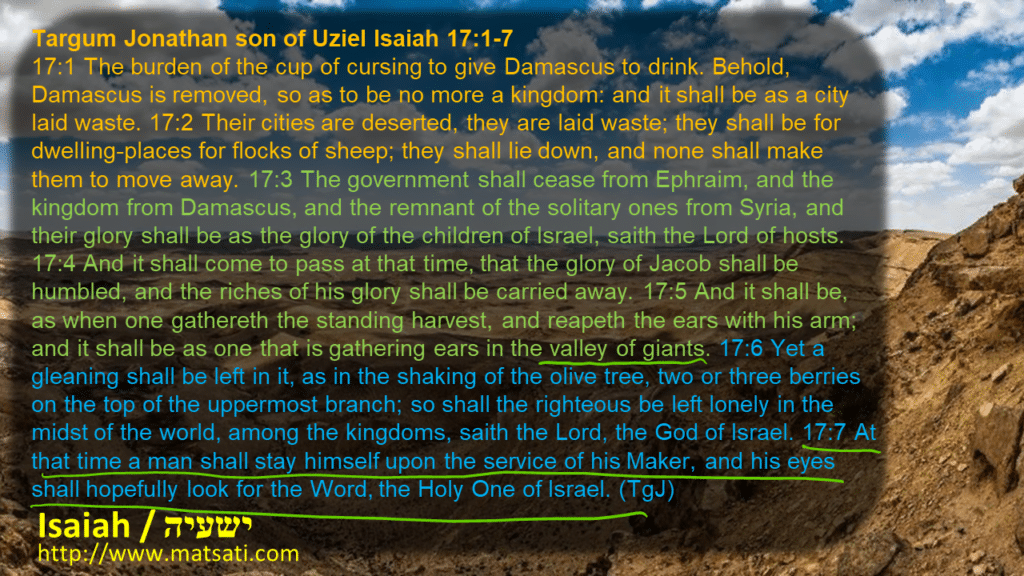
Targum Jonathan son of Uziel Isaiah 17:1-7
17:1 The burden of the cup of cursing to give Damascus to drink. Behold, Damascus is removed, so as to be no more a kingdom: and it shall be as a city laid waste. 17:2 Their cities are deserted, they are laid waste; they shall be for dwelling-places for flocks of sheep; they shall lie down, and none shall make them to move away. 17:3 The government shall cease from Ephraim, and the kingdom from Damascus, and the remnant of the solitary ones from Syria, and their glory shall be as the glory of the children of Israel, saith the Lord of hosts. 17:4 And it shall come to pass at that time, that the glory of Jacob shall be humbled, and the riches of his glory shall be carried away. 17:5 And it shall be, as when one gathereth the standing harvest, and reapeth the ears with his arm; and it shall be as one that is gathering ears in the valley of giants. 17:6 Yet a gleaning shall be left in it, as in the shaking of the olive tree, two or three berries on the top of the uppermost branch; so shall the righteous be left lonely in the midst of the world, among the kingdoms, saith the Lord, the God of Israel. 17:7 At that time a man shall stay himself upon the service of his Maker, and his eyes shall hopefully look for the Word, the Holy One of Israel. (TgJ)
According to the Targum, Jonathan translates Isaiah saying, א מַטַל כָס דִלוָט לְאַשקָאָה יָת דַמַסַק הָא דַמַסַק מִתעַדְיָא מִמַלכוּ וּתהֵי לִכרַך מְחַמְרָא׃ 17:1 The burden of the cup of cursing to give Damascus to drink. Behold, Damascus is removed, so as to be no more a kingdom: and it shall be as a city laid waste. ב שְבִיקָן קִרוֵיהֹון וְחָרבָן לְבֵית מִשרֵי עַדרִין דְעָן יִהוְייָן וְיִשרֹון וְלֵית דְמַנִיד׃ 17:2 Their cities are deserted, they are laid waste; they shall be for dwelling-places for flocks of sheep; they shall lie down, and none shall make them to move away. (TgJ) We note again how TgJ translates Isaiah 17:1 מַשָּׂא דַּמָּשֶֹק הִנֵּה דַמֶּשֶֹק מוּסָר מֵעִיר וְהָיְתָה מְעִי מַפָּלָה “The burden of Damascus. Behold, Damascus is taken away from being a city, and it shall be a ruinous heap” where the word מַשָּׂא “burden” is written to mean מַטַל כָס דִלוָט לְאַשקָאָה יָת דַמַסַק “the burden of the cup of cursing to drink Damascus.” The idea is that the city will be laid waste, and this particular outcome is due to their sins bringing a curse, per what the Torah of God states in the book of Devarim / Deuteronomy. We note the word מוּסָר musar is written in Isaiah 17:1. The frequency distribution of musar being written reveals this word occurs 50 times in the Hebrew bible.
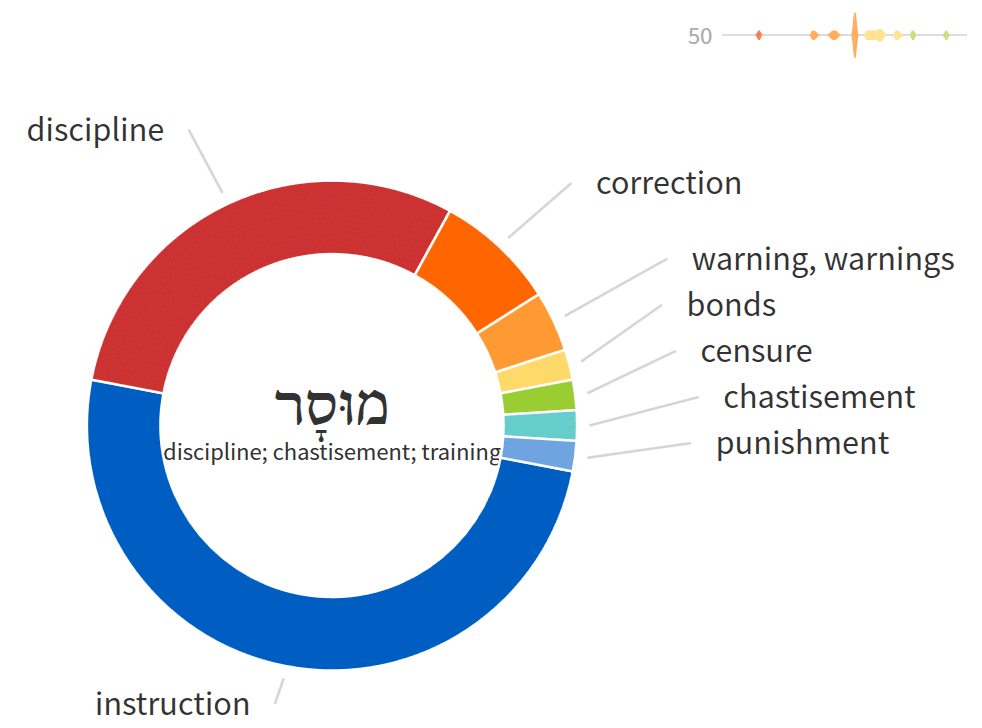
Musar means discipline, correction, reproof and we can see how it is translated in various locations shown above. Musar refers to corrective discipline or instruction. This noun is related to the verb יָסַר (yāsar, “to discipline”). It often refers to discipline or instruction intended to educate a person in the right way. This discipline leads to wisdom (Mishley / Proverbs 15:33). It may come from God (Mishley / Proverbs 3:11), or it may come from a human (Mishley / Proverbs 13:24, 15:5, 23:13). In Ezekiel 5:15, God says that desolated Jerusalem will be “a warning (mûsār) and a horror to the nations;” here the “warning” is an example of God’s discipline that should educate the nations about the consequences of disobeying God. The root יָסַר meaning to instruct, chastise, or train, according to Isaiah 17:1 suggests the city is turned from this, or that the city has been void of these things. When there is no discipline which means that one allows sin to run rampant unchecked, destruction is very near. Sin causes one to depart or turn from musar, to turn from the right or correct way. Note something that we read about sin according to the Torah in Bereshit / Genesis 4:7.
ספר בראשית פרק ד
ז הֲלוֹא אִם-תֵּיטִיב שְֹאֵת וְאִם לֹא תֵיטִיב לַפֶּתַח חַטָּאת רֹבֵץ וְאֵלֶיךָ תְּשׁוּקָתוֹ וְאַתָּה תִּמְשָׁל-בּוֹ:
ΓΕΝΕΣΙΣ 4:7
4:7 οὐκ, ἐὰν ὀρθῶς προσενέγκῃς, ὀρθῶς δὲ μὴ διέλῃς, ἥμαρτες; ἡσύχασον, πρὸς σὲ ἡ ἀποστροφὴ αὐτοῦ, καὶ σὺ ἄρξεις αὐτοῦ.
Bereshit / Genesis 4:7
4:7 If thou doest well, shalt thou not be accepted? and if thou doest not well, sin lieth at the door. And unto thee shall be his desire, and thou shalt rule over him. (KJV)
This ancient narrative describes a situation in which God tells Cain לַפֶּ֖תַח חַטָּ֣את רֹבֵ֑ץ “at the opening Sin is crouching / lurking.” The LXX states διέλῃς, ἥμαρτες; ἡσύχασον “at the door sin lays down.” There is a personification of sin here in the idea of laying down, that is coupled to a metaphor, οὐκ, ἐὰν ὀρθῶς προσενέγκῃς, ὀρθῶς δὲ μὴ διέλῃς, ἥμαρτες; ἡσύχασον. “If you made your offering correctly, but did not correctly divide it, did you not sin? hold thy peace.” In other words, the idea here is that Cain broke the requirement for the offering, and so he should not complain that his brother Abel’s offering was accepted and his was not. Cain thought he could change the way God had created things, such as the blood requirement for atonement. Under the principle of גזרה שוה – Gezerah Shavah Damascus who did not walk in the ways of God, and due to her unrepentant sin, she will be destroyed. Damascus chose to change the ways of God, even to worship false gods. She has turned from the right way to walk in her own ways.
Rashi writes the following concerning these verses.
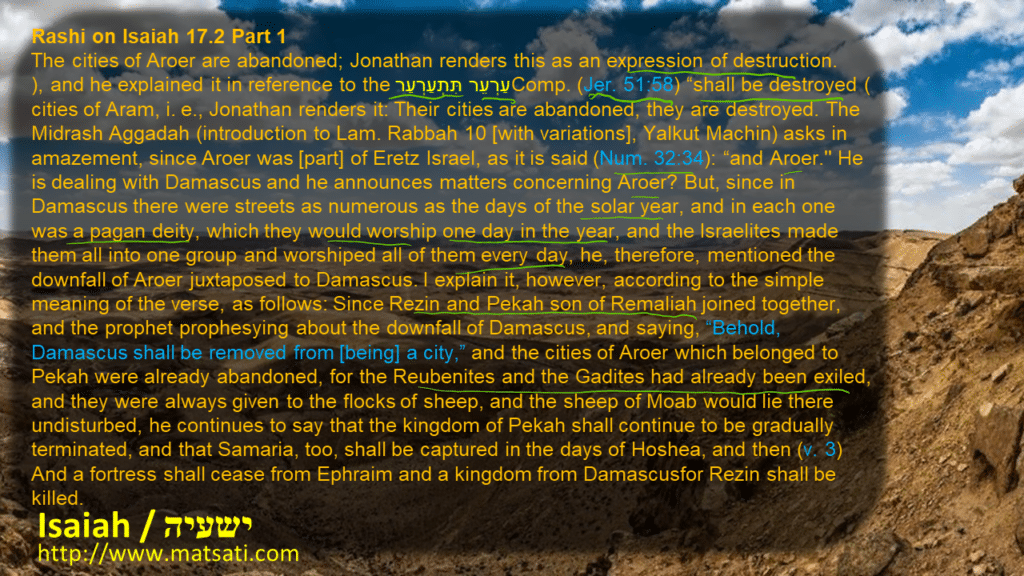
Rashi on Isaiah 17.2 Part 1
עזובות ערי ערוער. י”ת לשון חורבן כמו ערער תתערער ופירושו על ערי ארם, ומדרש אגדה מתמיה לפי שערוער מארץ ישראל היתה שנאמר (במדבר לב) ואת ערוער, עומד בדמשק ומכריז בערוער אלא שהיו בדמשק שווקים כמנין ימות החמה וכל אחת יש בה עכו”ם ועובדים לה יום אחד בשנה וישראל עשו את כולן קבוץ אחד והיו עובדין את כלם בכל יום לכך הזכיר מפלת ערוער אצל דמשק, ואני מפרשו לפי פשט המקרא על שנתחברו רצין ופקח בן רמליהו יחד והנביא היה מתנבא על מפלת דמשק ואמר הנה דמשק מוסר מעיר ערי ערוער שהיו של פקח כבר היו עזובות שגלו הראובני והגדי כבר והרי תמיד לעדרי צאן הם נתונות ורובצים שם צאן מואב ואין מחריד עוד תהי מלכות פקח הולכת וכלה ותלכד גם שומרון בימי הושע ואז ונשבת מבצר מאפרים וממלכה מדמשק שיהרג רצין:
The cities of Aroer are abandoned; Jonathan renders this as an expression of destruction. Comp. (Jer. 51:58) “shall be destroyed (עַרְעֵר תִּתְעַרְעַר), and he explained it in reference to the cities of Aram, i. e., Jonathan renders it: Their cities are abandoned, they are destroyed. The Midrash Aggadah (introduction to Lam. Rabbah 10 [with variations], Yalkut Machin) asks in amazement, since Aroer was [part] of Eretz Israel, as it is said (Num. 32:34): “and Aroer.” He is dealing with Damascus and he announces matters concerning Aroer? But, since in Damascus there were streets as numerous as the days of the solar year, and in each one was a pagan deity, which they would worship one day in the year, and the Israelites made them all into one group and worshiped all of them every day, he, therefore, mentioned the downfall of Aroer juxtaposed to Damascus. I explain it, however, according to the simple meaning of the verse, as follows: Since Rezin and Pekah son of Remaliah joined together, and the prophet prophesying about the downfall of Damascus, and saying, “Behold, Damascus shall be removed from [being] a city,” and the cities of Aroer which belonged to Pekah were already abandoned, for the Reubenites and the Gadites had already been exiled, and they were always given to the flocks of sheep, and the sheep of Moab would lie there undisturbed, he continues to say that the kingdom of Pekah shall continue to be gradually terminated, and that Samaria, too, shall be captured in the days of Hoshea, and then (v. 3) And a fortress shall cease from Ephraim and a kingdom from Damascusfor Rezin shall be killed.
Note how Rashi interprets these verses concerning Damascus stating that there were idols at every street corner (365 of them, one for each day of the year). He says that Israel made them all into one deity and worshiped all of them at the same time. This illustrates an interesting perspective that we may derive from the ancient Canaanite city state of Ugarit. In 1928 a group of French archaeologists journeyed with 7 camels, one donkey, and some burden bearers towards the location known as Ras Shamra. After a week at the site they discovered a cemetery 150 meters from the Mediterranean Sea. In the graves they discovered Egyptian and Phoenician artwork and alabaster. They also found some Mycenean and Cypriot materials. The literature that was discovered contained much of the theological and spiritual beliefs of the people of Canaan. Just as we see here in the book of Isaiah, the prophets of Israel spoke many words against Baal, Ashtoroth, and various other gods of the middle eastern cultures. When studying the Ugaritic texts, we learn that one of their gods is named YHVH, and El. El was in fact a chief god in Ugarit, and yet El is also how God in the Hebrew scriptures is described in the Psalms, and elsewhere, ie. El Shadai, etc. In addition, the very attributes for which THVH is acclaimed are the same for which El is acclaimed in the Ugaritic texts. In 1 Kings 22:19-22 we read of the Lord God meeting with his heavenly council. There are similar descriptions of heaven which one finds in the Ugaritic texts. It is highly likely it was from this perspective that the people of Israel chose to integrate or assimilate the Canaanite gods into their worship of HaShem (the Name, YHVH), the God of Israel.
Rashi takes the פשת–Peshat, the simple, literal historical narrative meaning of the text and describes this place as slowly (gradually) being destroyed. This is a very interesting way to describe the effect of sin upon one’s life. Observe the coupling of these things together, how Rashi speaks of the flocks, the beast of the field, and sin’s gradual effects upon one’s life. The Torah provides us with an understanding of sin as being a form of “animal” behavior, based on the lower instincts and unreflective desires, and therefore the sacrifice of an animal was intended to reveal the end result of what happens to those who ignore sin in their lives allowing it to go unchecked. Note Yeshua’s words according to Luke 13:1-3.
הַבְּשׂוֹרָה עַל־פִּי לוּקַס פרק יג
א בְּאוֹתָהּ עֵת הָיוּ שָׁם אֲנָשִׁים שֶׁסִּפְּרוּ לוֹ עַל הַגְּלִילִיִּים אֲשֶׁר פִּילָטוֹס עֵרַב אֶת דָּמָם בְּזִבְחֵיהֶם. ב הֵשִׁיב לָהֶם יֵשׁוּעַ׃ ״הַאִם מִפְּנֵי שֶׁהַגְּלִילִיִּים הָאֵלֶּה סָבְלוּ זֹאת סְבוּרִים אַתֶּם שֶׁהֵם הָיוּ חוֹטְאִים גְּדוֹלִים יוֹתֵר מִכָּל אַנְשֵׁי הַגָּלִיל? ג לֹא! אוֹמֵר אֲנִי לָכֶם. אַךְ אִם לֹא תַּחְזְרוּ בִּתְשׁוּבָה, כֻּלְכֶם תֹּאבְדוּ כְּמוֹתָם.
Luke 13:1-3
13:1 There were present at that season some that told him of the Galilaeans, whose blood Pilate had mingled with their sacrifices. 13:2 And Jesus answering said unto them, Suppose ye that these Galilaeans were sinners above all the Galilaeans, because they suffered such things? 13:3 I tell you, Nay: but, except ye repent, ye shall all likewise perish. (KJV, ܒ݁ܗܰܘ ܕܷ݁ܝܢ ܙܰܒ݂ܢܳܐ ܂ ܐܷܬ݂ܱܘ ܐ̱ܢܴ̈ܫܺܝܢ ܐܷܡܰܪܘ ܠܷܗ ܁ ܥܰܠ ܓ݁ܠܻܝ̈ܠܴܝܶܐ ܇ ܗܳܢܽܘܢ ܕ݁ܦ݂ܺܝܠܱܛܴܘܣ ܚܠܱܛ ܕܷ݁ܡܗܽܘܢ ܥܰܡ ܕܷ݁ܒ݂ܚܰܝ̈ܗܽܘܢ ܂ܘܰܥܢܳܐ ܝܶܫܽܘܥ ܂ ܘܶܐܡܰܪ ܠܗܽܘܢ ܁ ܣܳܒ݂ܪܻܝܢ ܐܢ̄ܬܾ݁ܘܢ ܆ ܕ݁ܗܳܠܷܝܢ ܓ݁ܠܻܝ̈ܠܴܝܶܐ ܞ ܚܰܛܴܝܻ̈ܝܢ ܗ̄ܘܰܘ ܁ ܝܰܬܻ݁ܝܪ ܡܶܢ ܟܾ݁ܠܗܽܘܢ ܓ݁ܠܻܝ̈ܠܴܝܶܐ ܂ ܕ݁ܗܳܟ݂ܰܢܳܐ ܗܘܳܐ ܐܷܢܽܘܢ ܆ ܠܴܐ ܂ ܐܴܡܰܪ ܐ̱ܢܳܐ ܠܟ݂ܽܘܢ ܕܷ݁ܝܢ ܆ ܕܴ݁ܐܦ݂ ܟܾ݁ܠܟ݂ܽܘܢ ܐܷܠܴܐ ܬ݁ܬ݂ܾܘܒ݂ܽܘܢ ܂ ܗܳܟ݂ܰܢܳܐ ܬܻ݁ܐܒ݂ܕܾ݁ܘܢ ܂)
One thing not to be mistaken about is concerning the destruction that comes. One man is not superior in his sins over another man. There are various levels of wickedness, one man may be greater than another in this way by what he does, but the way sin is understood from the sense of bringing destruction as Isaiah and Yeshua are describing is judged the same. These words that Yeshua speaks explains that destruction comes due to sin and without repentance there is no way to stave off the destruction that will follow.
The TgJ goes on saying, ג וְיִבטַל שֻלטָן מֵאַפרַיִם וּמַלכוּ מִדַמַסַק וּשאָר יְחִידָאִין מֵאְרָם וִיקָרְהֹון כִיקָר בְנֵי יִשׂרָאֵל יְהֹון אְמַר יוי צְבָאֹות׃ 17:3 The government shall cease from Ephraim, and the kingdom from Damascus, and the remnant of the solitary ones from Syria, and their glory shall be as the glory of the children of Israel, saith the Lord of hosts. ד וִיהֵי בְעִידָנָא הַהוּא יִמאַך יְקָר יַעְקֹב וְעֹותַר יְקָרֵיה יִגלֵי׃ 17:4 And it shall come to pass at that time, that the glory of Jacob shall be humbled, and the riches of his glory shall be carried away. ה וִיהֵי כְמִכנַש חְצָד קָמָא וּבִדרָעֵיה שוּבלִין יִחצוּד וִיהֵי כִמלַקֵיט שוּבלִין בְמֵישַר גִיבָרַיָא׃ 17:5 And it shall be, as when one gathereth the standing harvest, and reapeth the ears with his arm; and it shall be as one that is gathering ears in the valley of giants. (TgJ) It is interesting how when Israel joined herself with the religious worship of the indigenous peoples, they also joined themselves with the destruction that comes to those peoples. Rashi describes these verses in the following way.
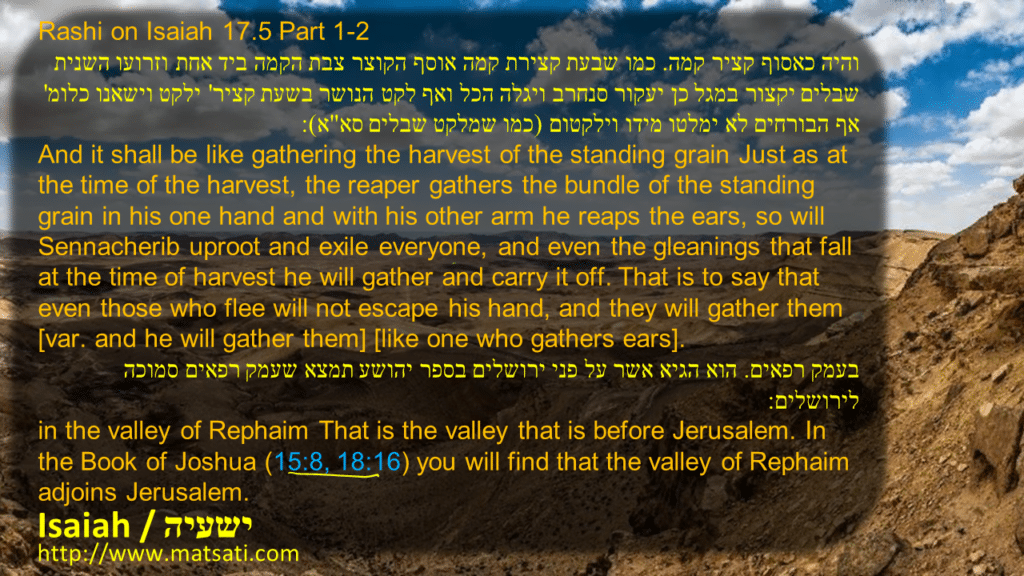
Rashi on Isaiah 17.5 Part 1-2
והיה כאסוף קציר קמה. כמו שבעת קצירת קמה אוסף הקוצר צבת הקמה ביד אחת וזרועו השנית שבלים יקצור במגל כן יעקור סנחרב ויגלה הכל ואף לקט הנושר בשעת קציר’ ילקט וישאנו כלומ’ אף הבורחים לא ימלטו מידו וילקטום (כמו שמלקט שבלים סא”א):
And it shall be like gathering the harvest of the standing grain Just as at the time of the harvest, the reaper gathers the bundle of the standing grain in his one hand and with his other arm he reaps the ears, so will Sennacherib uproot and exile everyone, and even the gleanings that fall at the time of harvest he will gather and carry it off. That is to say that even those who flee will not escape his hand, and they will gather them [var. and he will gather them] [like one who gathers ears].
בעמק רפאים. הוא הגיא אשר על פני ירושלים בספר יהושע תמצא שעמק רפאים סמוכה לירושלים:
in the valley of Rephaim That is the valley that is before Jerusalem. In the Book of Joshua (15:8, 18:16) you will find that the valley of Rephaim adjoins Jerusalem.
Anyone who has tried their hand at gardening has experienced what Rashi is describing here when it comes to pulling weeds from around the vegetable producing plants. In fact, there are some weeds that are so difficult to remove by just pulling, one must take a small hand shovel to break up the dirt and roots which illustrates the violent removal of the weeds. Rashi describes the removal of the people of Israel by Sennacherib in this manner, gathering a bundle of standing grain and uprooting the plants completely, pulling them out of the ground, and not even leaving the gleanings for the poor to gather. This illustration is said to occur in the Valley of Raphaim, the valley before the holy city of Jerusalem. The TgJ continues saying, ו וְיִשתַאְרָן בֵיה עֹולְלָן כְבֵיעוּר זֵיתָא תְרֵין תְלָתָה גַרגְרִין בְרֵיש צַנפָא אַרבְעָה חַמשָה בְסֹוכָא מָרְדָא כֵין יִשתַאְרוּן יְחִידָאִין צַדִיקַיָא בְגֹו עָלְמָא בֵינֵי מַלכְווָתָא אְמַר יוי אְלָהָא דְיִשׂרָאֵל 17:6 Yet a gleaning shall be left in it, as in the shaking of the olive tree, two or three berries on the top of the uppermost branch; so shall the righteous be left lonely in the midst of the world, among the kingdoms, saith the Lord, the God of Israel. ז ׃ בְעִידָנָא הַהוּא יִסתְמֵיך אְנָשָא עַל פֻלחַן עָבְדֵיה וְעֵינֹוהִי לְמֵימַר קַדִישָא דְיִשׂרָאֵל יִסַבְרָן׃ 17:7 At that time a man shall stay himself upon the service of his Maker, and his eyes shall hopefully look for the Word, the Holy One of Israel. (TGJ) The idea here is that there will however be some people left, and when these events happen, these things will lead to one realizing the inadequacy of worshiping idols. The Asherah poles were wooden symbols of Asherah, Canaanite fertility goddess and consort of Baal, Chemosh of the Moabites, etc. The Northern Kingdom of Israel was widely influenced by the religion of the neighboring nations, and many worshiped these false gods. But when under Assyrian attack, Israel would realize that only the Lord God of Israel could deliver them. The same may be true of the Moabite people, as the TgJ writes that at this time a man will establish himself upon the service of his Maker, and hopefully he will look for the word of the Holy One of Israel. Teshuvah (Repentance) is derived from the root word שוב (shuv) meaning “to turn” which is more accurately understood to mean that one turns to God. This is the application of our faith, to be faithful to God and turn from evil to walk in God’s holy ways. We note that the greek word for repentance, μετάνοια is more than simply “a change of mind” but to learning to turn radically from our own ways to changing our way of thinking and what we do, to turn from evil. Notice something here, according to the TgJ and the Hebrew bible, that God in His kindness leaves a remnant for the sake of working a miracle in the lives of those who remain whose end goal is to generate faith and faithfulness in God and His Word. We note something here that faith would be impossible without the Lord God working in our lives. Faith itself is a miracle, just like what we see here in the tragic events that result from unrepentant sin. Note how Yeshua says “It is the Spirit that gives life; the flesh is no help at all.” (John 6:63) This means that God is calling to all people by means of His Holy Spirit, to draw men to the understanding that He truly is Lord over all, Creator, and Maker! Paul writes in 1 Corinthians 10 that all of these things and events were written down so that we too can read, believe, and have faith, and know the difference between right and wrong, and what it means to repent from our sins. All of God’s Word has application for our lives today, and through these Words we find in Isaiah and in all of Scripture, this is the power of God in our lives, to build our faith, to bring us to repentance, to turn us away from our attempts to defend or justify ourselves to trust in God and in His Messiah (Yeshua) and the Lord God will heal our separation from Him, and we will have peace and fellowship with Him forever!
